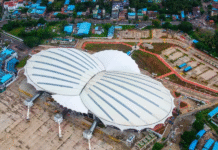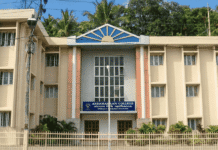A five-day hands-on training programme for Atal Tinkering Lab (ATL) in-charges of government and private schools commenced today at the ATL laboratory of GSSS Haddo. Organised to boost innovation and creativity in school ecosystems across the Andaman and Nicobar Islands, the initiative marks a critical step in aligning education with future skills and experiential learning.
Inaugurating the event as the chief guest, Gyan Sheel Dubey, Head of Office and Deputy Director of Education (Admin), highlighted the importance of equipping ATL in-charges with practical knowledge and encouraging them to promote innovation among students. The programme aims to build a strong foundation in technology-based problem-solving, creative thinking, and project-based learning through interactive sessions.
The inaugural session began with a welcome address by Ram Parvesh, DDE (Science), who outlined the growing significance of the ATL ecosystem in the islands. He emphasised that such training would not only strengthen the capacity of ATL coordinators but also catalyse a scientific mindset and inventive spirit among students.
The training, classified as Phase-I, brings together ATL in-charges from diverse schools, ranging from GSSS Goal Tikrey in Kamorta to GSSS Diglipur, ensuring wide coverage across the geographically scattered archipelago. Participants are being trained through group activities, prototype-building exercises, and practical demonstrations intended to replicate real-world innovation processes.
Three key resource persons are facilitating the sessions: Sudeep Chakraborty from DBRAIT, M. Sakthivel from SOVTECH, and Anisha Ahmed from ITI. Each brings domain expertise to help participants navigate various stages of tinkering, from ideation to execution. The modules are designed to help teachers mentor students effectively and guide them in developing functional, need-based technological models.
As part of the programme, school representatives will explore themes such as automation, electronics, robotics, and sustainability. This not only introduces students to STEM disciplines early but also prepares them to face 21st-century challenges using innovation as a core tool.
The ATL initiative under NITI Aayog has seen gradual yet steady adoption in the islands. By bringing this first phase of hands-on training to local educators, the administration seeks to institutionalise innovation as part of everyday schooling, rather than treating it as an extracurricular element.
While some schools have already undertaken projects under the ATL framework, this training is expected to help standardise the approach, offer clarity on implementation, and ensure every lab operates with a uniform vision and technical proficiency.
Moreover, the cross-school collaboration during the training creates a platform for educators to share best practices and develop a common language of innovation, especially vital in remote and disconnected regions like Andaman and Nicobar Islands.
The initiative reflects a broader strategy by the Directorate of Education to bridge the innovation divide between mainland and island schools. With this Phase-I now underway, more such training programmes are anticipated in the coming months to ensure no ATL in-charge is left behind in this transformative journey.
By grounding the training in practical outcomes and peer learning, the administration hopes to create a ripple effect, where empowered teachers build inspired students who, in turn, can become problem-solvers of tomorrow. As the sessions continue through the week, the spotlight remains firmly on innovation as the engine of educational growth across the Islands.





